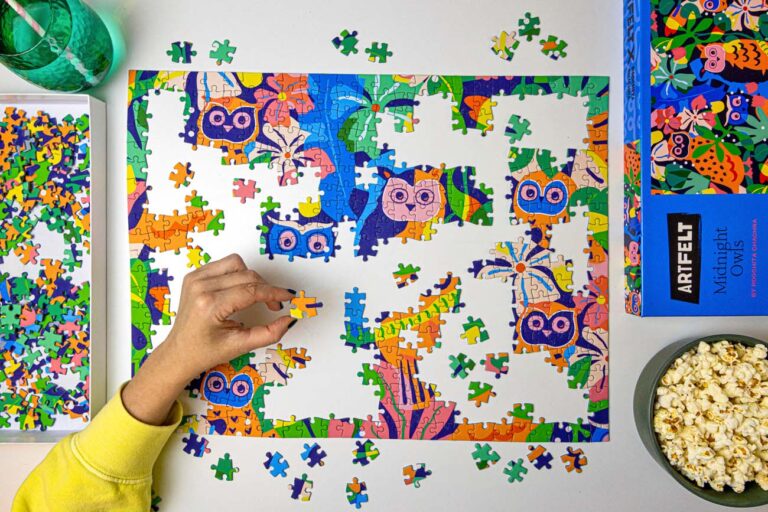Winter has a way of slowing everything down. The light fades a little earlier, the air bites a little harder, and the quiet nights stretch longer than we remember. For many, it’s a season that can feel heavy.
We reach for our screens, scroll until our thumbs ache, and promise ourselves that tomorrow we’ll “do better.” We’ll eat more protein, stretch, drink more water, and journal. All of these are wonderfully healthy.
But what if the antidote to burnout and overwhelm wasn’t another wellness hack at all?
What if it was something simpler, slower, and far more satisfying?
Enter: the humble jigsaw puzzle. Once the domain of rainy-day afternoons and grandparents’ card tables, puzzles are now one of the most unexpectedly powerful tools for modern mental wellness.
The Rise of the Puzzle Ritual
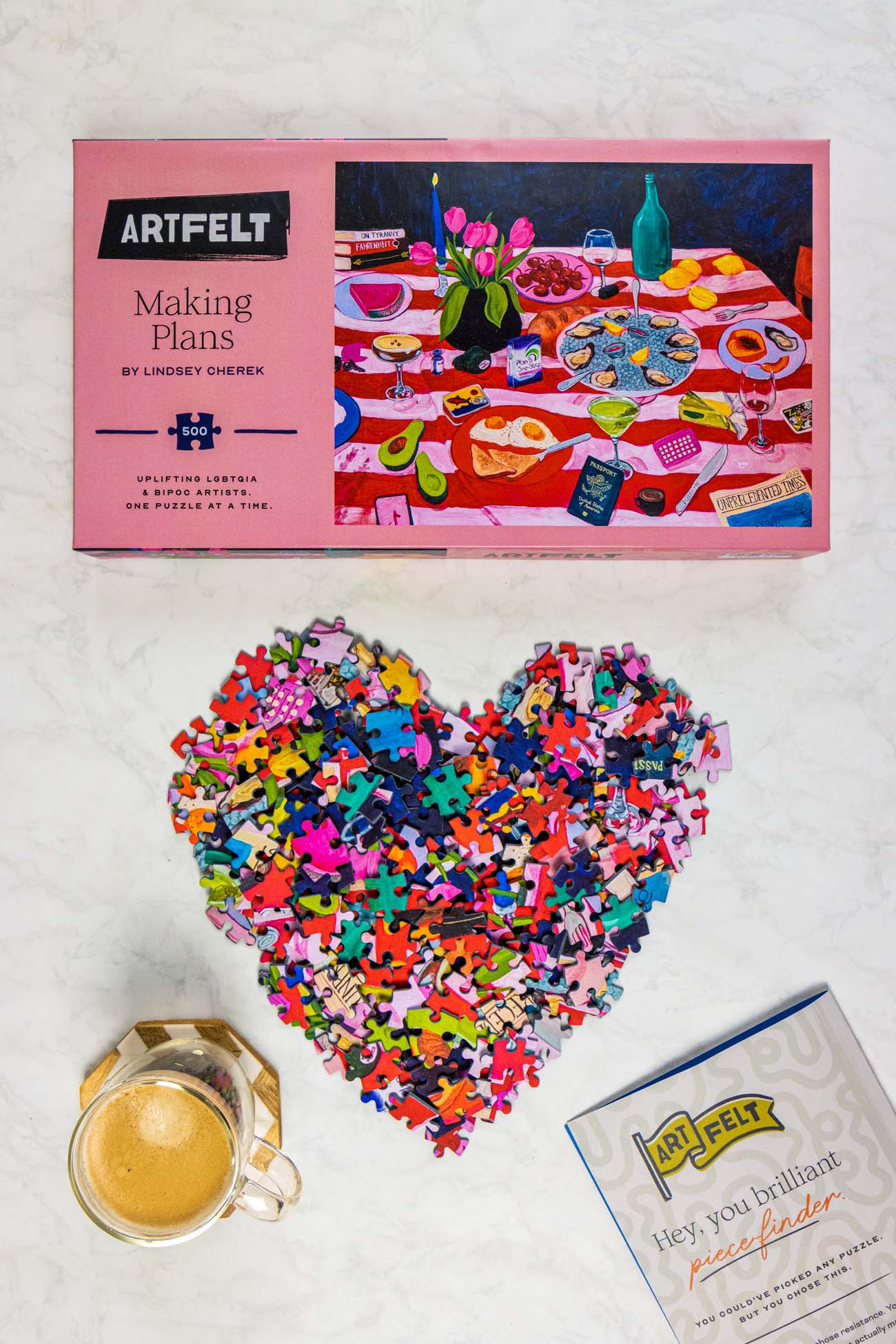
There’s something quietly radical happening on coffee tables everywhere. Instead of zoning out to yet another series or doom-scrolling through endless feeds, people are piecing together something tangible, bit by bit, color by color, moment by moment.
And I’m officially obsessed. Why? The benefits for wellness are real.
- The act of puzzling draws you into what psychologists call a flow state: that immersive focus where time slips away and stress melts.
- Research shows that activities like puzzles can reduce cortisol, improve short-term memory, and even stimulate both sides of the brain at once, combining creativity and logic in one calming hit.
- Unlike meditation apps or five-step morning routines, puzzles ask for nothing more than your attention and give back something far more meaningful: a sense of accomplishment and calm you can actually hold in your hands.
And perhaps that’s why they’re having a moment. In a world obsessed with optimization, puzzles are gloriously analog. They remind us that slow can still be satisfying, and that joy doesn’t need to be downloaded.
Beyond Beige: The Art Revival of Puzzles
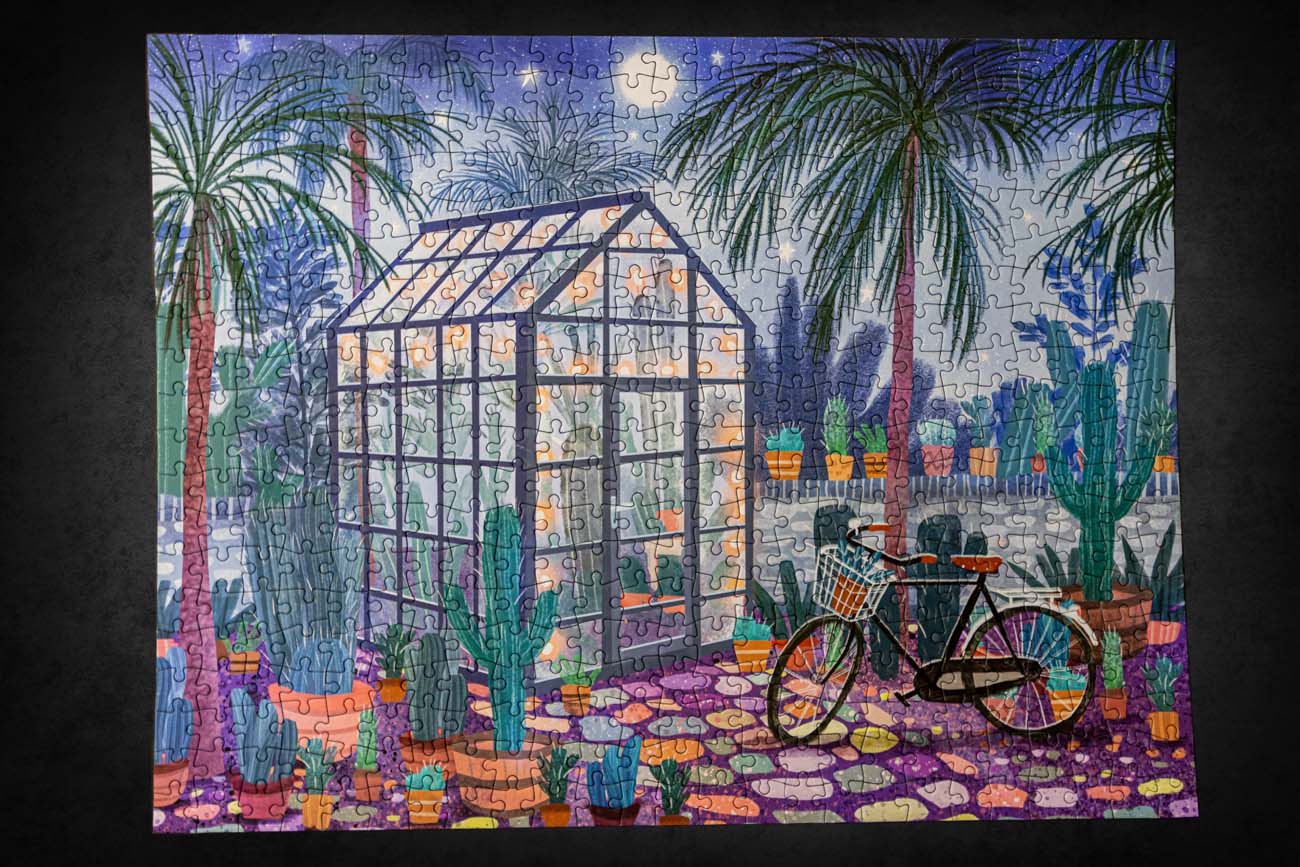
Of course, not all puzzles are created equal. The days of muted landscapes and generic still-lifes are (thankfully) over.
A new generation of puzzle brands are redefining what puzzling looks and feels like.
One standout is Artfelt Puzzles, a queer-owned company turning puzzles into both art and activism. Each design is a collaboration with LGBTQIA+ and BIPOC artists, transforming the puzzle table into a platform for representation, visibility, and joy.
Founder Sarah Julian explains, “We wanted to make puzzles that make you feel something – joy, rebellion, connection, calm (often all at once) – and meaningful enough to connect you to a bigger story.”
Artfelt launched with ten designs that are anything but beige — think tropical explosions of color, joyful portraits, and surreal dreamscapes. Each one brings a spark of energy and narrative that’s the perfect antidote to winter’s gray monotony.
Their collaborations include artists like Bats Langley, whose “Picnic Pets” puzzle is a riot of color and whimsy, and Roochita Chachra, whose fruit-filled piece practically radiates sunshine. It’s art you can touch, piece by piece.
I Was a Skeptic Now I’m a Superfan: ArtFelt Rekindled My Love for Puzzles
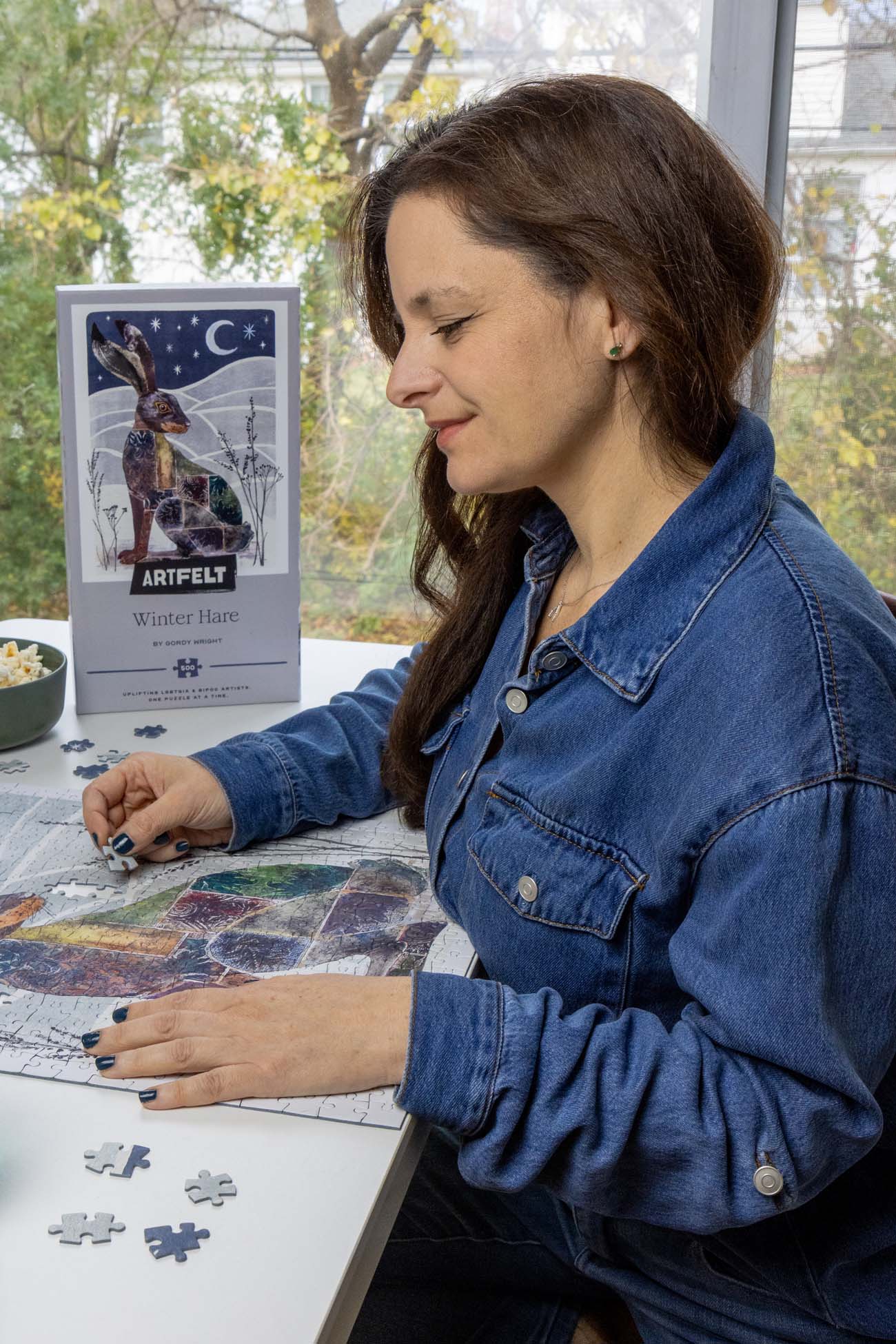
While I know the benefits of puzzles are real, I honestly didn’t know if I would enjoy doing them again. Let’s just say it’s been a while. And as an adult with a to-do list and a flea-like attention span, I thought I had outgrown them.
But I stumbled across Artfelt and I loved their mission to uplift artists and offer their art as frameworthy puzzles. So I picked out a few of my favorite prints to see if puzzling could work its magic on me.
I used to think puzzles were for passing time. Now they’re my new happy place.
On the night I got my puzzles in the mail (they came quicker than expected), I cleared off my table, grabbed a cup of coffee, and opened The Winter Hare puzzle box first. I immediately started sorting pieces and finding edge pieces. And within a few minutes of snapping those pieces into place, I started to feel less scattered, noticeably calmer, and more centered.
And truthfully, as adorable as this print was, it wasn’t easy. Having a white edged border meant that the strategy of putting the edge pieces together first wasn’t going to work on this one. Some sections even seemed impossible to do at times. But after snapping the last piece together I felt a true sense of accomplishment. And as the puzzle came together I connected with the image in a way I didn’t think possible.
And there’s more reasons to love Artfelt puzzles. You can choose from 500 or 1000 pieces for each puzzle design. Some of my other favorites are the dreamy Midnight in the Garden by Laura Watkin and Midnight Owls by Roochita Chachra in joyfully bright colors.
Their puzzles are Environmentally Friendly made using FSC-certified paper, 100% recycled millboard, and printed with vegan-friendly inks. I found the prints were bold and beautiful.
Artfelt also partners with LGBTQ and BIPOC artists to create their puzzles who receive a percentage of every puzzle you buy. There’s a print for everyone with more yet to come.
The puzzles are beautiful and vibrant. And it’s nice to know you’re doing good not only for your own wellness, but you’re also helping the artists behind the puzzles.
The Science of Slowing Down With Puzzles
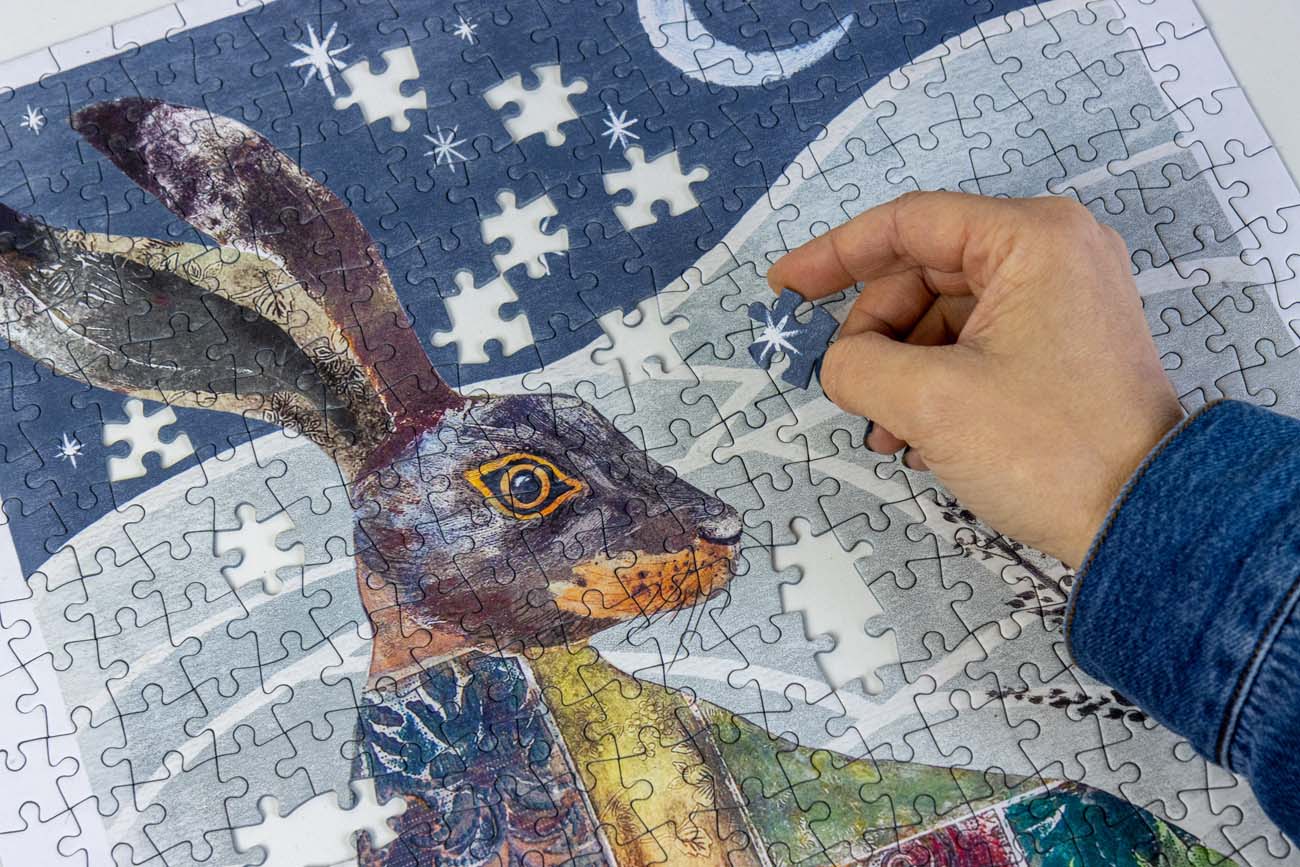
When was the last time you truly lost track of time doing something offline?
That’s what puzzles offer. They are a form of active rest.
FACT: Neuroscientists say that repetitive, goal-oriented activities (like sorting pieces or finding edges) can quiet the amygdala. This is the part of the brain responsible for anxiety.
At the same time, completing small tasks triggers dopamine, the feel-good neurotransmitter that keeps us motivated and balanced.
In short: puzzling is good for your brain chemistry.
But the benefits go beyond the neurological. For many, puzzles are also emotional resets.
Tangible, screen-free rituals that give structure to restless evenings. The satisfaction of connecting one tiny piece at a time feels especially grounding in a world that often feels chaotic and fragmented.
“Puzzles remind us that progress doesn’t always look fast,” says Julian. “Sometimes you just have to sit with the mess, trust the process, and keep finding the next piece.”
Turning Your Puzzle Time Into a Wellness Ritual
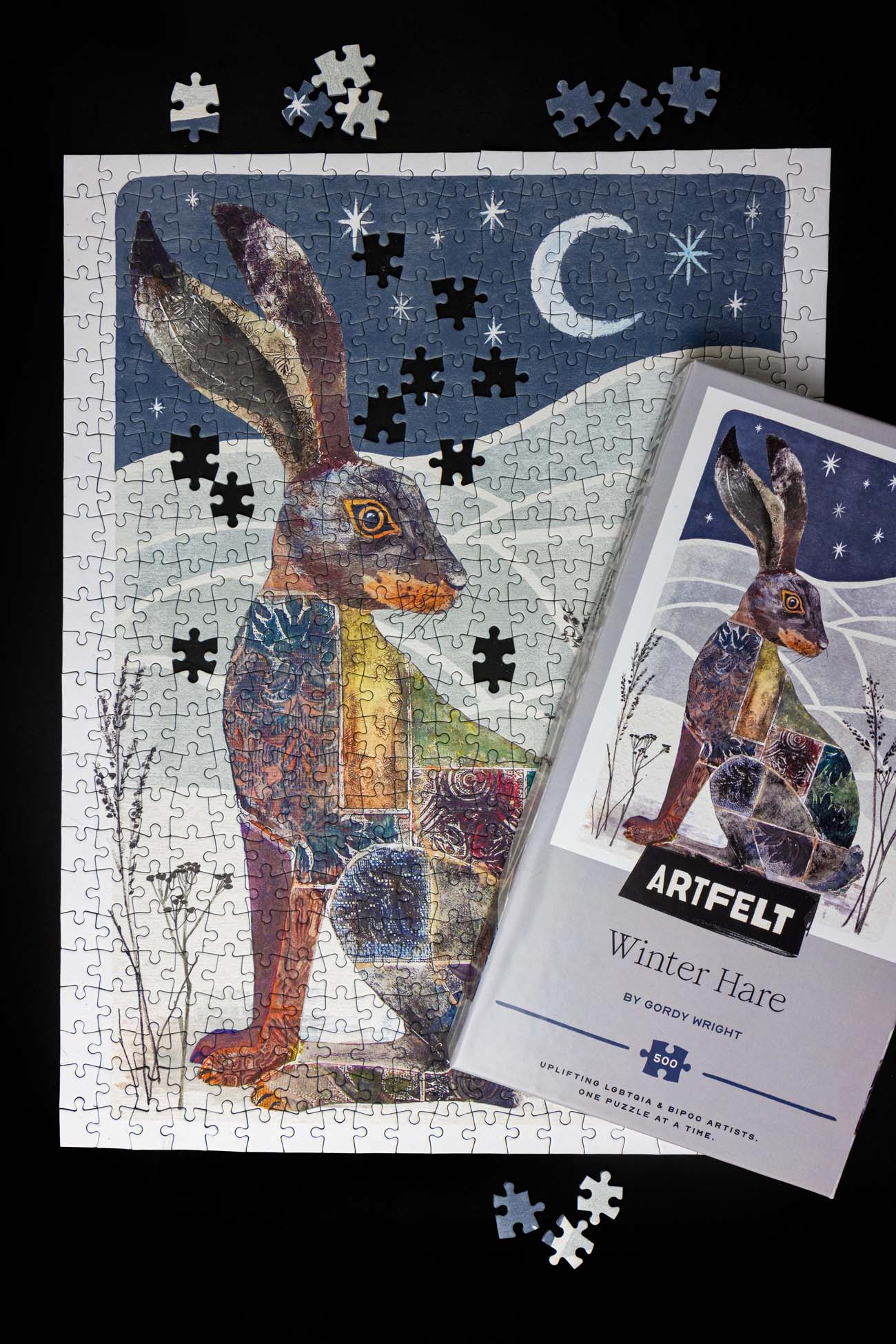
If you’re new to puzzling, or returning after years away, here’s how to make it your winter wellness ritual:
- Set the scene. Choose a cozy spot with good lighting and a flat surface. Light a candle, play your favorite playlist, or pour a glass of something warm. Make it feel intentional.
- Start with art that speaks to you. Skip the dull designs. Pick a puzzle that makes you feel something – whether it’s color, humor, or emotion.
Pro Tip: Artfelt’s collection is full of vibrant, inclusive art that sparks joy at first glance.
- Go slow. Forget the timer. This isn’t a race, it’s a process. Let yourself linger, sort, rearrange, and celebrate every “aha” moment.
- Make it social. Puzzling can be beautifully communal. Invite a friend over for wine and puzzles, or make it a family night ritual. Shared silence can be surprisingly connective.
- Reflect on what you built. When the final piece clicks into place, take a moment.
You created order from chaos, literally. Frame it, photograph it, or simply sit back and enjoy the stillness.
Dive into Artfelt’s Quiet Revolution on the Tabletop
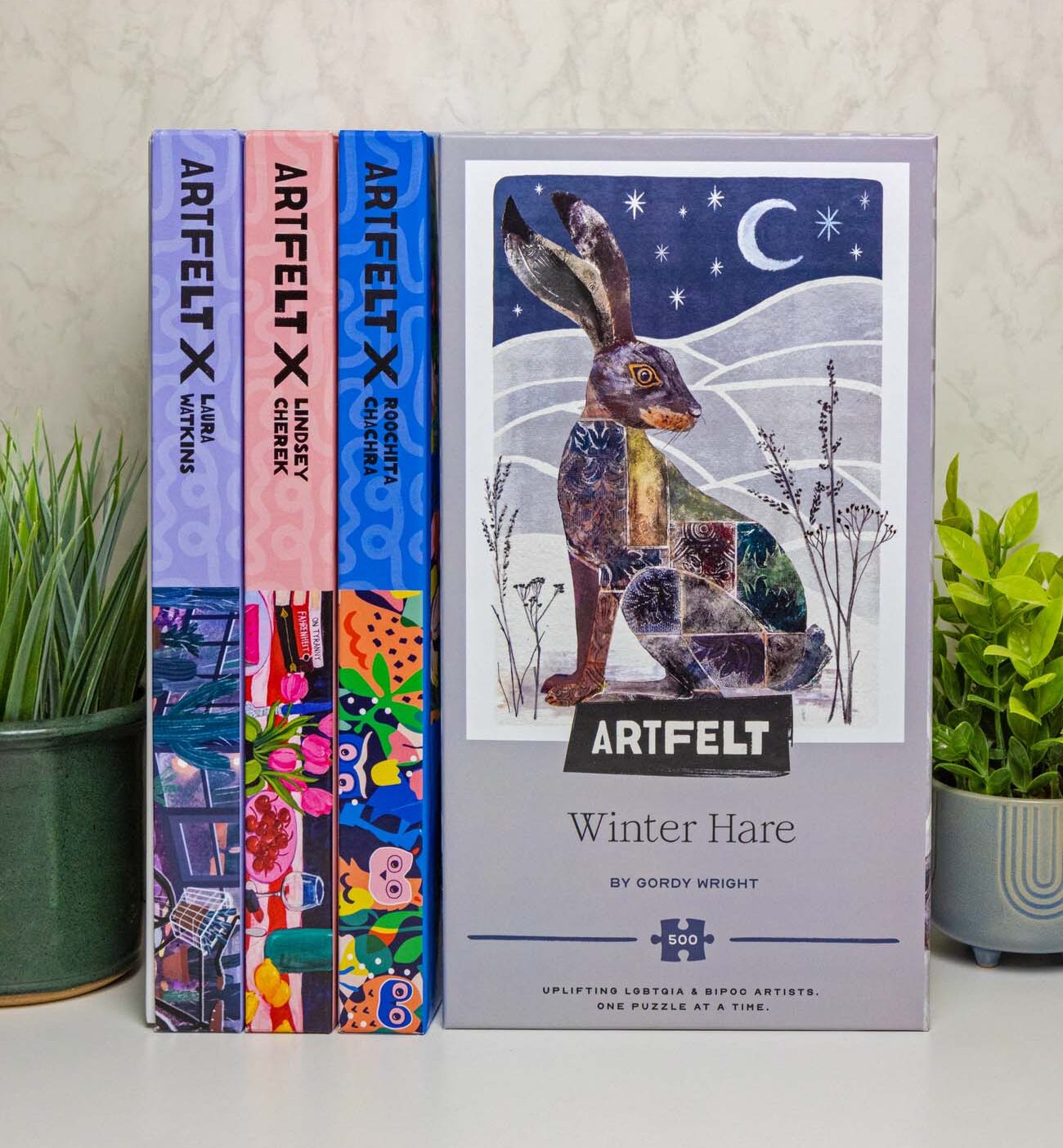
There’s something quietly subversive about finding peace in a puzzle. It resists the noise, the urgency, and the constant 24-hour news cycle that defines modern life.
Instead, doing a puzzle is creative, mindful, and inclusive. Especially when that puzzle carries a deeper story, like the ones from Artfelt Puzzles.
As Julian puts it, “We wanted to give people something beautiful to build and something meaningful to be part of.”
So this winter, when the nights feel long and your brain feels full, resist the urge to scroll. Spread out the pieces instead. Build something vibrant, intentional, and joy-filled.
Because in a world full of quick fixes, the most radical thing you can do for your wellness might just be to slow down, one piece at a time.
Better Living uses affiliate links. If you make a purchase through them, we may receive a small commission (for which we are deeply grateful) at no cost to you.

